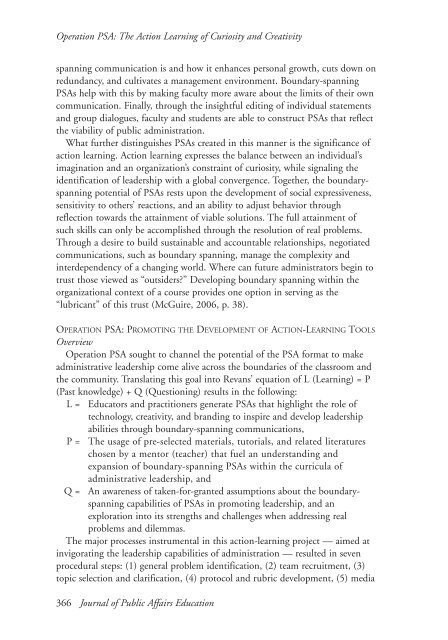JOURNAL OF PUBLIC AFFAIRS EDUCATION - naspaa
JOURNAL OF PUBLIC AFFAIRS EDUCATION - naspaa
JOURNAL OF PUBLIC AFFAIRS EDUCATION - naspaa
Create successful ePaper yourself
Turn your PDF publications into a flip-book with our unique Google optimized e-Paper software.
Operation PSA: The Action Learning of Curiosity and Creativity<br />
spanning communication is and how it enhances personal growth, cuts down on<br />
redundancy, and cultivates a management environment. Boundary-spanning<br />
PSAs help with this by making faculty more aware about the limits of their own<br />
communication. Finally, through the insightful editing of individual statements<br />
and group dialogues, faculty and students are able to construct PSAs that reflect<br />
the viability of public administration.<br />
What further distinguishes PSAs created in this manner is the significance of<br />
action learning. Action learning expresses the balance between an individual’s<br />
imagination and an organization’s constraint of curiosity, while signaling the<br />
identification of leadership with a global convergence. Together, the boundaryspanning<br />
potential of PSAs rests upon the development of social expressiveness,<br />
sensitivity to others’ reactions, and an ability to adjust behavior through<br />
reflection towards the attainment of viable solutions. The full attainment of<br />
such skills can only be accomplished through the resolution of real problems.<br />
Through a desire to build sustainable and accountable relationships, negotiated<br />
communications, such as boundary spanning, manage the complexity and<br />
interdependency of a changing world. Where can future administrators begin to<br />
trust those viewed as “outsiders” Developing boundary spanning within the<br />
organizational context of a course provides one option in serving as the<br />
“lubricant” of this trust (McGuire, 2006, p. 38).<br />
OPERATION PSA: PROMOTING THE DEVELOPMENT <strong>OF</strong> ACTION-LEARNING TOOLS<br />
Overview<br />
Operation PSA sought to channel the potential of the PSA format to make<br />
administrative leadership come alive across the boundaries of the classroom and<br />
the community. Translating this goal into Revans’ equation of L (Learning) = P<br />
(Past knowledge) + Q (Questioning) results in the following:<br />
L = Educators and practitioners generate PSAs that highlight the role of<br />
technology, creativity, and branding to inspire and develop leadership<br />
abilities through boundary-spanning communications,<br />
P = The usage of pre-selected materials, tutorials, and related literatures<br />
chosen by a mentor (teacher) that fuel an understanding and<br />
expansion of boundary-spanning PSAs within the curricula of<br />
administrative leadership, and<br />
Q = An awareness of taken-for-granted assumptions about the boundaryspanning<br />
capabilities of PSAs in promoting leadership, and an<br />
exploration into its strengths and challenges when addressing real<br />
problems and dilemmas.<br />
The major processes instrumental in this action-learning project — aimed at<br />
invigorating the leadership capabilities of administration — resulted in seven<br />
procedural steps: (1) general problem identification, (2) team recruitment, (3)<br />
topic selection and clarification, (4) protocol and rubric development, (5) media<br />
366 Journal of Public Affairs Education
















